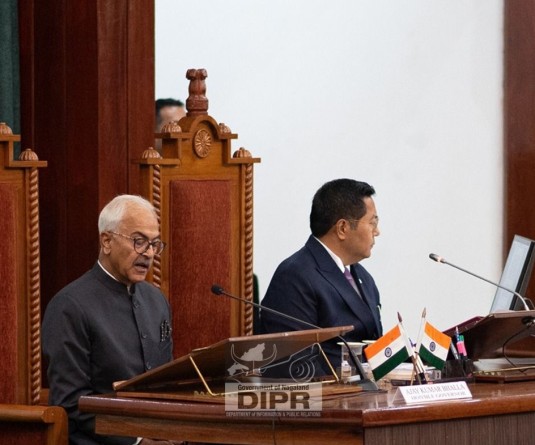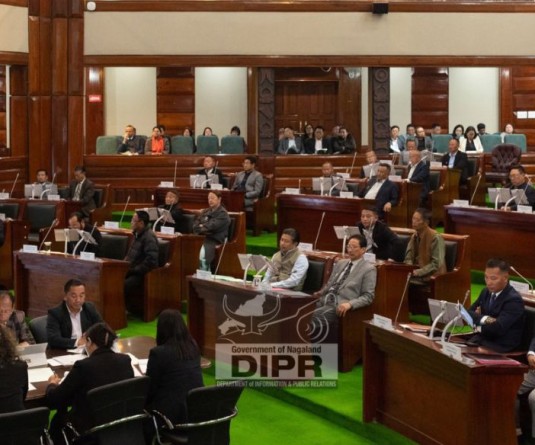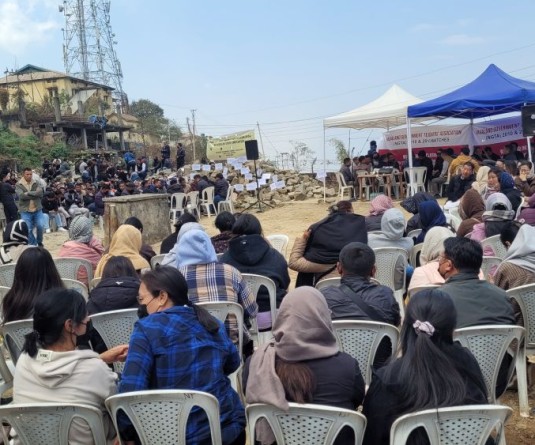Music as catalyst for positive change in Nagaland

Morung Photo by Soreishim Mahong
Lack of good content a major challenge for Naga artistes
Morung Express News
Dimapur | February 28
Conversations around the need to create a bigger and inclusive space for the arts took the centre stage at the Don Bosco Institute for Development & Leadership (DBIDL), Don Bosco Campus, Riverbelt Colony today.
‘The Conversation on Music and the Arts – A catalyst for positive change in Nagaland’ was held with Kekhrie Ringa, Infinty Inc artiste; Theja Meru, Advisor, Task Force for Music and Arts (TaFMA); Alobo Naga, singer, writer and composer and Renthunglo Shitiri, poet, teacher and performer as discussants.
The discourse is an initiative of Heritage Publishing House, Morung Foundation and The Morung Express, where discussions on different issues are held on a regular basis with the central theme on ‘change.’
Arts as conscience of the people
As a poet and a performer, Renthunglo said she viewed her works as a means of asserting her identity; “an attempt on my part to find a voice, for people to hear my point of view.”
She said writing is a medium for searching and seeking truths, “to be the eyes, ears, the mouth and the conscience of the people.”
Alobo, on the change that he visualizes through his music, narrated a recent incident in Pune where a man came up to him and said that he was contemplating suicide, but changed his mind when he heard Alobo’s song that day.
Sharing that it was just one of the many encounters he had, Alobo believed that music is one of the biggest tools to go and reach out to people on different levels.
An artiste of Infinity Inc, Kekhrie, who is also a music teacher, spoke about the positive effects music has on people. It improves mental health, and is used as a therapy for emotional stress and health.
Making a remark that hard work beats talent any day, she also observed a vast difference between a musician who is formally trained and who is not. The ones genuinely interested in music learn how “music disciplines people,” Kekhrie said.
TaFMA positively looking forward
On the music scene in Nagaland and its impact over the years, Theja said with certainty, “It has drastically changed, or rather evolved, over the last three decades” with the coming of internet and social media platforms.
“Maybe not much in terms of impacting, as a catalyst for social change,” said Theja, but music as a catalyst for individual change, “very much!”
Witnessing individuals make a 360 turn through music, Theja, however said “for a corporate change, it’s going to take a lot of discourse like this.”
Stressing on the need to promote arts and the art culture, he said the major challenge facing the Naga artistes is “to create a good content.”
This he viewed was because “the Naga people are seemingly too laid-back and have zero discipline as a musician nor the passion for learning.”
"We need to start the narrative and put in action the envisioning of what our future will be, and in that process, we can bring about change. We (TaFMA) are positively and aggressively looking forward,” Theja added.
On policies and support from the government to the upcoming artistes, the Advisor said that the upcoming events from TaFMA would be focused mainly on the talented Naga artistes.
Alobo on the other hand, insisted that one does not require support from the government to make a living, especially from a musician’s point of view.
“If I was waiting for the government, I wouldn’t be here,” he asserted.
Work smart, not hard
Confessing that he never sees himself as a musician, but rather an entrepreneur, Alobo said that people (musicians) earn recognition through their own struggle. If they (government) help musicians, it’s great but if not, that's okay too, he added.
On his views on the music industry in Nagaland, Alobo shared that it was only when he went out that he realised how big the competition was. Stating “we are still lacking behind,” Alobo advised the young upcoming artistes to study the market, and work smart, not hard.
Stating that there are many talented Naga artistes and bands, the singer requested TaFMA to be partial and pick “only those musicians who are really good, serious and deserving.”
Also, on being vocal about not performing for free, “you should be in a position to demand that,” Alobo added.
Dr Aküm Longchari, Publisher of The Morung Express, in his concluding remarks held that the discussion witnessed “a lot of optimism, pessimism and a real dose of realism. And we need to find a way to intertwine through it.”
Dr Longchari also contemplated on how there are a lot of performers but not really artistes.
“Are we really artistes on that sense? Artiste is a state of mind. We don't exist in a vacuum. We exist in relationship to each other,” he said.
The relevance of arts in the 21st century is in fact more than ever before, Dr Longchari said while adding that the arts really have a place to bring a change in a society that has become more polarised.






